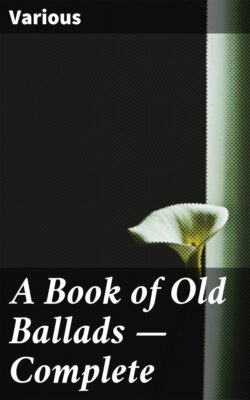Читать книгу A Book of Old Ballads — Complete - Various - Страница 9
На сайте Литреса книга снята с продажи.
V
ОглавлениеTable of Contents
How were the early ballads born? Who made them? One man or many? Were
they written down, when they were still young, or was it only after the
lapse of many generations, when their rhymes had been sharpened and
their metres polished by constant repetition, that they were finally
copied out?
To answer these questions would be one of the most fascinating tasks
which the detective in letters could set himself. Grimm, listening
in his fairyland, heard some of the earliest ballads, loved them,
pondered on them, and suddenly startled the world by announcing that
most ballads were not the work of a single author, but of the people at
large. Das Volk dichtet, he said. And that phrase got him into a lot of trouble. People told him to get back to his fairyland and not make such ridiculous suggestions. For how, they asked, could a whole people make a poem? You might as well tell a thousand men to make a tune, limiting each of them to one note!
To invest Grimm's words with such an intention is quite unfair.
[Footnote: For a discussion of Grimm's theories, together with much
interesting speculation on the origin of the ballads, the reader should
study the admirable introduction to English and Scottish Popular Ballads, published by George Harrap & Co., Ltd.] Obviously a multitude of people could not, deliberately, make a single poem any more than a multitude of people could, deliberately, make a single picture, one man doing the nose, one man an eye and so on. Such a suggestion is grotesque, and Grimm never meant it. If I might guess at what he meant, I would suggest that he was thinking that the origin of ballads must have been similar to the origin of the dance, (which was probably the earliest form of aesthetic expression known to man).
The dance was invented because it provided a means of prolonging ecstasy
by art. It may have been an ecstasy of sex or an ecstasy of victory …
that doesn't matter. The point is that it gave to a group of people an
ordered means of expressing their delight instead of just leaping about
and making loud cries, like the animals. And you may be sure that as the
primitive dance began, there was always some member of the tribe a
little more agile than the rest--some man who kicked a little higher or
wriggled his body in an amusing way. And the rest of them copied him,
and incorporated his step into their own.
Apply this analogy to the origin of ballads. It fits perfectly.
There has been a successful raid, or a wedding, or some great deed of
daring, or some other phenomenal thing, natural or supernatural. And now
that this day, which will ever linger in their memories, is drawing to
its close, the members of the tribe draw round the fire and begin to
make merry. The wine passes … and tongues are loosened. And someone
says a phrase which has rhythm and a sparkle to it, and the phrase is
caught up and goes round the fire, and is repeated from mouth to mouth.
And then the local wit caps it with another phrase and a rhyme is born.
For there is always a local wit in every community, however primitive.
There is even a local wit in the monkey house at the zoo.
And once you have that single rhyme and that little piece of rhythm, you
have the genesis of the whole thing. It may not be worked out that
night, nor even by the men who first made it. The fire may long have
died before the ballad is completed, and tall trees may stand over the
men and women who were the first to tell the tale. But rhyme and rhythm
are indestructible, if they are based on reality. "Not marble nor the
gilded monuments of princes shall outlive this powerful rhyme."
And so it is that some of the loveliest poems in the language will ever
remain anonymous. Needless to say, all the poems are not anonymous. As society became more civilized it was inevitable that the peculiar circumstances from which the earlier ballads sprang should become less frequent. Nevertheless, about nearly all of the ballads there is "a common touch", as though even the most self-conscious author had drunk deep of the well of tradition, that sparkling well in which so much beauty is distilled.
